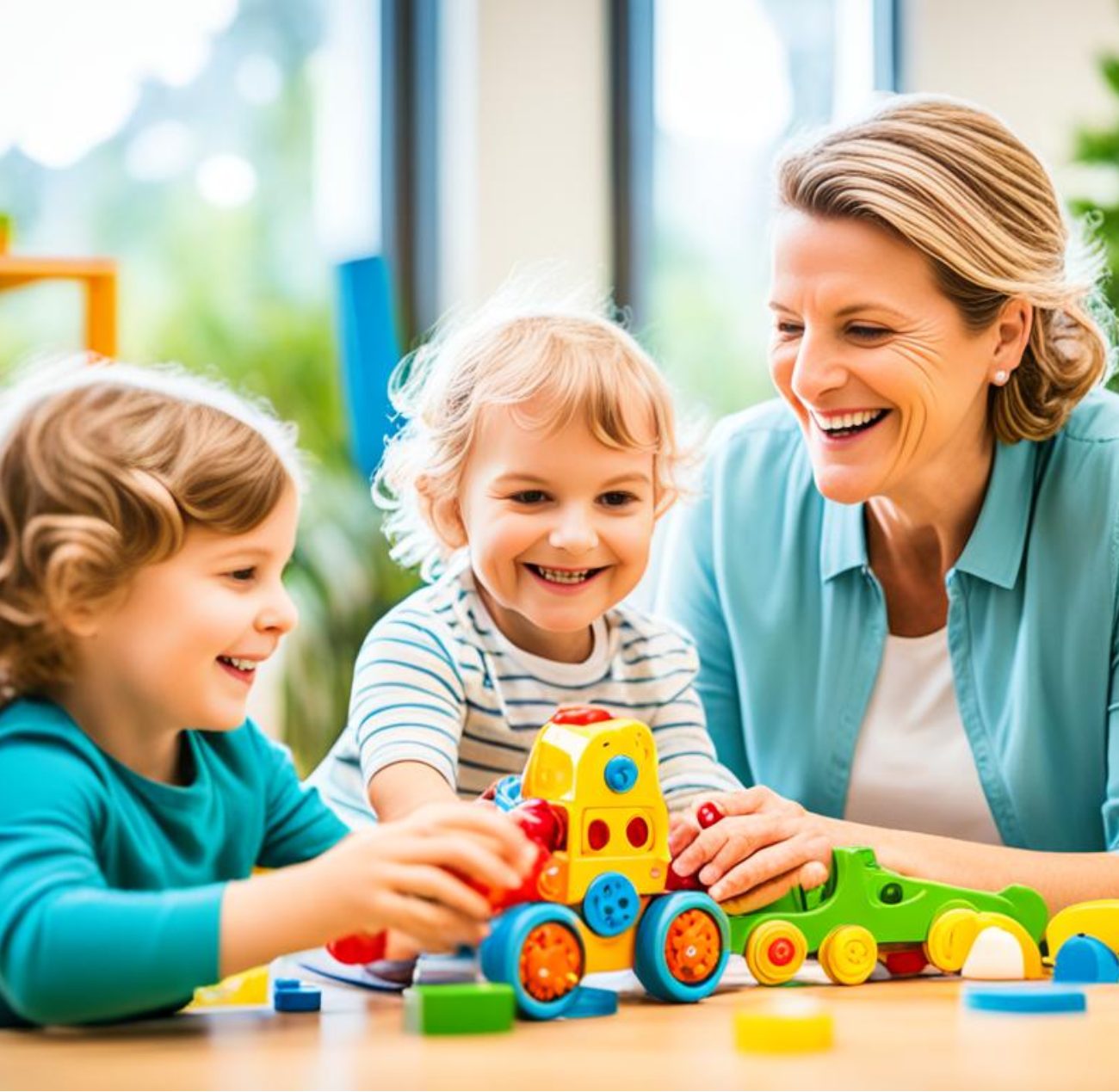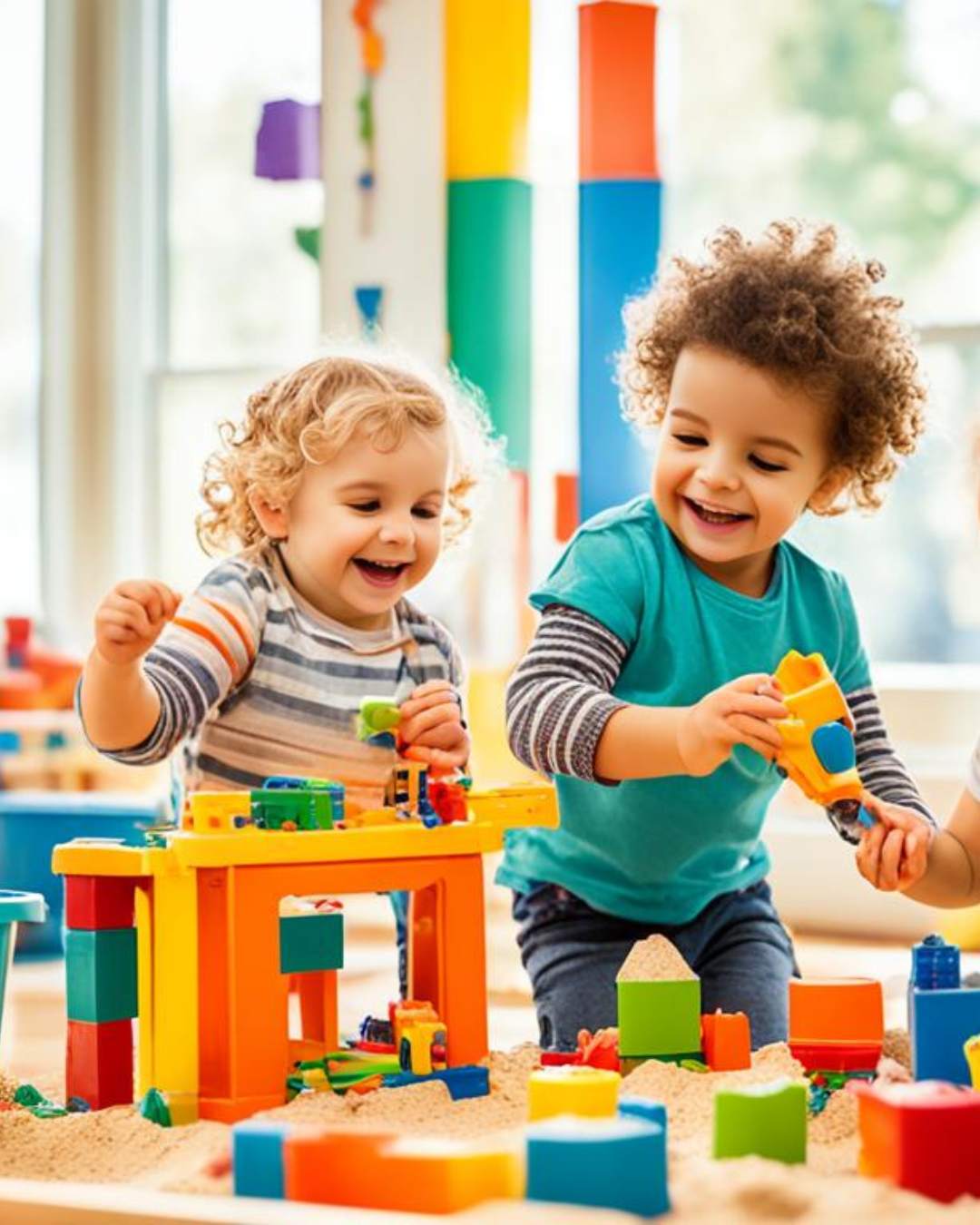The Benefits of Play-Based Learning in Preschools
Did you know that play-based learning in preschools has a profound impact on child development? It goes beyond just keeping kids entertained. Educational play and interactive activities are key components of a play-based curriculum that promotes holistic growth and learning through play. From enhancing cognitive skills to fostering creativity and social development, play-based learning in early childhood education sets the stage for lifelong success. In this article, we will explore the numerous benefits of play-based learning and how it shapes the future of preschool education.
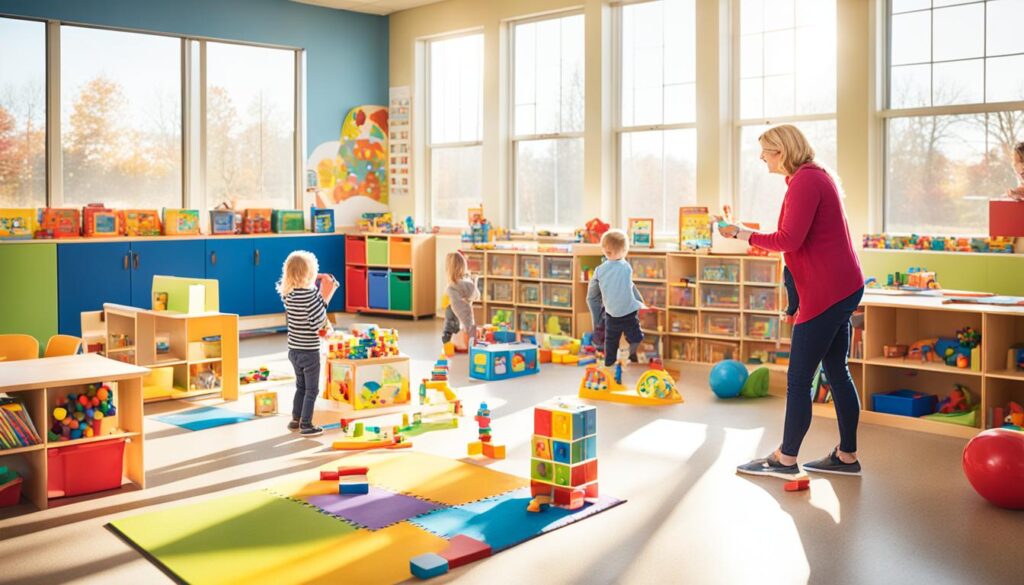
The Importance of Play in Preschool Settings
Play-based learning is a common practice in preschool settings. It allows children to engage in child-directed and voluntary play that promotes collaboration, communication, critical thinking, and creativity. Through play, children have the opportunity to explore and learn in interactive and meaningful ways, fostering their overall development.
Play-based learning in preschools goes beyond mere entertainment. It serves as a powerful tool for early childhood education, supporting children's cognitive, social, emotional, and physical development. By creating a play-rich environment, educators empower children to actively participate in their learning journey, laying a strong foundation for future academic success.
One of the key benefits of play-based learning in preschools is its ability to nurture collaboration and communication skills. When children engage in play, they naturally learn how to interact with their peers, negotiate roles, and cooperate towards a common goal. This collaborative spirit fosters a sense of belonging and helps children develop essential social and emotional skills that will benefit them throughout their lives.
Critical thinking is another crucial skill that is nurtured through play-based learning. Play allows children to experiment, problem-solve, and make decisions in a safe and supportive environment, encouraging them to think critically and creatively. This process of exploration and discovery fosters curiosity and a love for learning, which are essential qualities for lifelong success.
Play-based learning in preschool settings also stimulates creativity in children. Through imaginative play, artistic expression, and open-ended activities, children can explore their own ideas, invent new scenarios, and think outside the box. This fosters a sense of innovation and originality, cultivating a generation of creative thinkers and problem solvers.
By integrating play into preschool settings, early childhood educators provide a holistic learning experience that caters to the diverse needs and learning styles of children. Through play, children not only acquire knowledge, but they also develop the skills and attitudes necessary for future academic and personal success. Play-based learning empowers children to become active participants in their own learning, fostering collaboration, communication, critical thinking, and creativity in a playful and engaging environment.
The Role of Teachers in Play-Based Learning
Teachers play a crucial role in facilitating play-based learning. They have the power to create an environment that nurtures children's natural inclination to play and learn. While some teachers may view play and learning as distinct activities, play-based learning recognizes that play is a powerful tool for learning and development.
From different perspectives, teachers approach play-based learning in various ways. Some educators predominantly provide opportunities for free play, allowing children to explore and engage in unstructured play independently. Free play encourages children to follow their interests, make decisions, and problem-solve, fostering creativity and independence.
On the other hand, some teachers see play as a means of learning in and of itself. They employ guided play, where teachers actively participate in children's play, providing guidance, support, and intentional learning opportunities. Guided play helps children develop specific skills and knowledge in a structured yet playful manner.
Understanding the range of play types and perspectives allows educators to enhance the power of play in their classrooms. By recognizing the value of both free play and guided play, teachers can create a balanced play-based curriculum that supports children's holistic development.
Embracing play-based learning and its various perspectives empowers teachers to foster a love for learning, creativity, and critical thinking skills in their students. By valuing and incorporating play into their teaching practices, teachers create dynamic and engaging learning environments where children thrive.
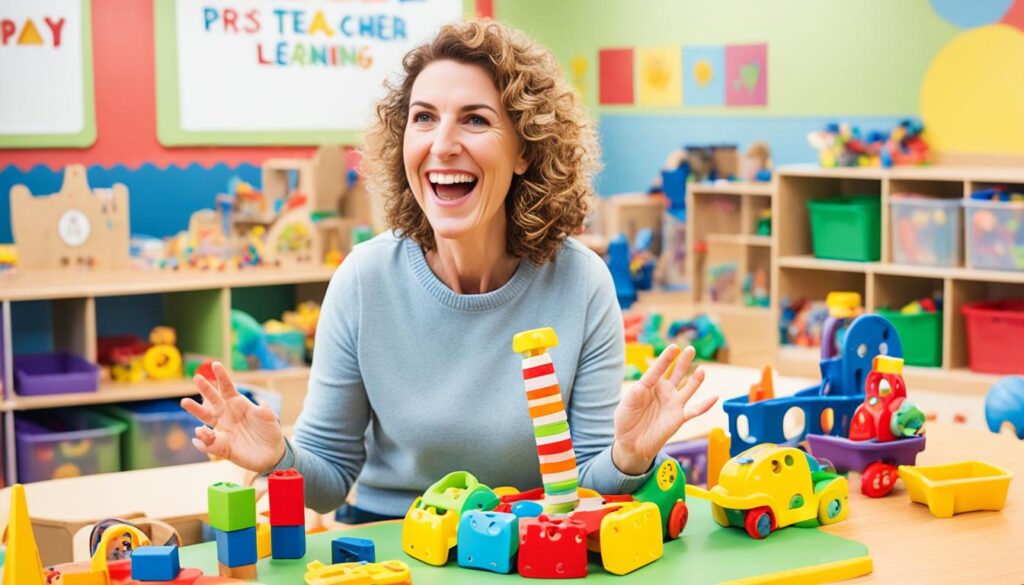
The Benefits of Free Play and Guided Play
When it comes to play-based learning in preschool settings, two forms of play that play a vital role in a child's development are free play and guided play. These forms of play offer unique benefits that contribute to a child's social, cognitive, and emotional development.
The Benefits of Free Play
Free play allows children to engage in child-directed, voluntary, and flexible play. During free play, children have the freedom to choose their activities, use their imagination, and explore their interests. This form of play encourages creativity, problem-solving, and independent thinking.
Through free play, children also develop their social skills as they interact and cooperate with their peers. They learn to negotiate, share, and take turns, which are essential skills for building positive relationships later in life. Additionally, free play fosters cognitive development as children navigate new environments, experiment with cause and effect, and engage in symbolic play.
The Benefits of Guided Play
Guided play involves a more structured approach to play, with teachers providing guidance, support, and introducing learning opportunities. In guided play, teachers create a balance between allowing children to explore their interests and providing intentional teaching moments.
By incorporating learning objectives into guided play experiences, teachers can target specific cognitive and social skills, ensuring that children are exposed to new concepts and ideas. Guided play enhances cognitive development by encouraging problem-solving, critical thinking, and decision-making skills.
Furthermore, guided play offers opportunities for children to develop their emotional and social skills. As teachers provide guidance during play, children learn to recognize and regulate their emotions, navigate conflicts, and collaborate with others.
The Power of Both Forms of Play
Both free play and guided play are crucial for a child's holistic development. Free play promotes imagination, creativity, and independence, while guided play supports intentional learning and the development of specific skills.
These forms of play complement each other, creating a comprehensive approach to child development. By incorporating both forms of play in preschool settings, educators can provide a balanced learning environment that fosters social, cognitive, and emotional development.
Incorporating Play in Learning Environments
Play-based learning environments provide the perfect setting for children to engage in open-ended play, explore their surroundings, and actively develop their language, cognitive, and social skills. By creating a supportive learning environment that encourages play, teachers can nurture a child's natural curiosity and promote holistic development.
Nurturing Language Development
Through play, children have countless opportunities to enhance their language skills. Storytelling, for example, allows children to use their imaginations, express themselves, and build their vocabulary. By engaging in pretend play, children develop their communication skills as they negotiate roles, share ideas, and interact with their peers. These playful activities lay a strong foundation for language development.
Fostering Cognitive Development
Play-based learning provides the ideal platform for promoting cognitive development. Building towers with blocks, for instance, encourages problem-solving, spatial awareness, and logical thinking. Playful activities like sorting objects or puzzles help children refine their cognitive skills, such as memory, attention span, and pattern recognition. By incorporating play into the learning environment, teachers can empower children to become active learners and thinkers.
Supporting Social Development
Playing with others allows children to practice and develop essential social skills. In a play-based learning environment, children collaborate, negotiate, and share resources with their peers. Through cooperative play, they learn valuable lessons about teamwork, empathy, and conflict resolution. By fostering social interactions through guided play, teachers help children develop strong social competence and build positive relationships.
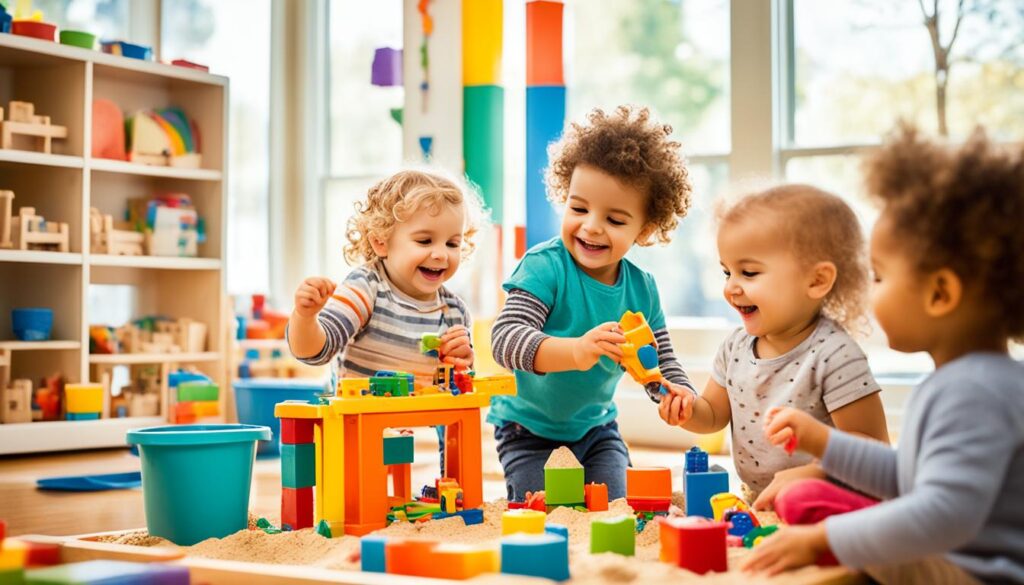
The Impact of Play-Based Learning on Physical and Creative Development
Play-based learning goes beyond academic skills and has a profound impact on children's physical and creative development. Through play, children have the opportunity to engage in various activities that promote the development of fine and gross motor skills, balance, coordination, and physical fitness.
One of the ways play-based learning supports physical development is through the enhancement of fine motor skills. Activities such as drawing, coloring, and manipulating small objects encourage the development of hand-eye coordination, finger dexterity, and precise movements. These skills are crucial for tasks like writing, buttoning clothes, and tying shoes.
In addition to fine motor skills, play-based learning also nurtures gross motor skills. Running, jumping, climbing, and playing sports not only help children develop strength, stamina, and flexibility but also enhance their coordination and spatial awareness. These physical skills are vital for everyday activities like walking, navigating obstacles, and playing with peers.
Playful activities also stimulate children's creativity and imagination. Engaging in art projects, role-playing scenarios, and imaginative games provides opportunities for children to express themselves, think critically, problem-solve, and generate novel ideas. These creative experiences foster cognitive development and encourage children to explore their interests and passions.
By integrating play-based learning into early childhood education, educators can support children's physical and creative development while ensuring a holistic approach to learning. It is through play that children not only learn important academic concepts but also develop crucial life skills that will benefit them in the long run. So, create an environment where children can play, explore, and grow - their physical and creative selves will thank you!
Fostering a Positive Attitude Towards Learning Through Play
Play-based learning is not only a fun and engaging approach for children but also a powerful tool for fostering a positive attitude towards learning. When children are immersed in play-based activities, they develop a lifelong love for learning, which contributes to their overall educational journey.
Through play, children experience joy and excitement, creating a positive association with the learning process. Whether they are building with blocks, exploring nature, or engaging in imaginative play, the sense of enjoyment and curiosity motivates them to actively participate and explore new concepts.
When children enjoy their learning environment and feel a sense of autonomy, they are more likely to retain information. Play-based learning allows children to make connections, experiment, and apply their knowledge in a meaningful way, leading to better retention and transfer of information. This not only builds a strong foundation for future academic success but also instills confidence in their abilities.
Moreover, play-based learning nurtures a growth mindset in children. They develop resilience, problem-solving skills, and a willingness to take risks. By encouraging creativity and exploration, play-based learning helps children embrace challenges and view them as opportunities for growth. This positive attitude towards learning enables them to approach new tasks and experiences with confidence, adaptability, and enthusiasm.
By integrating play-based learning into early childhood education, educators lay the groundwork for lifelong learning and success. Children who have experienced the joys of play-based learning are more likely to become lifelong learners, continuously seeking knowledge and embracing new experiences. This creates a positive feedback loop, as their positive attitude towards learning fuels their motivation and engagement, leading to even greater learning outcomes.
Conclusion
Play-based learning in preschool education has numerous benefits for young children's development. Through play, children experience enhanced language and cognitive development as they engage in interactive and stimulating activities. Additionally, play-based learning supports the development of social and emotional skills, fostering healthy relationships and self-expression.
By incorporating play in early childhood education, educators can create engaging and holistic learning experiences. These experiences not only provide a solid foundation for future academic success but also nurture a positive attitude towards learning. When children enjoy their learning environment and participate in playful activities, they are more likely to retain information and develop a lifelong love for learning.
Preschool education, with its focus on play-based learning, empowers children to explore, experiment, and develop essential skills. As they build towers with blocks, create artwork, or role-play, children develop fine and gross motor skills, balance, coordination, as well as unleash their creativity and imagination. This balanced approach to learning ensures that children's physical and creative development is nurtured from an early age.
In conclusion, play-based learning in preschool education is a valuable and effective approach that benefits children's overall development. It offers a dynamic and engaging learning experience where children can thrive and grow emotionally, socially, and intellectually. By prioritizing play, educators pave the way for a bright future for children, equipping them with the necessary skills and fostering a lifelong love for learning.

